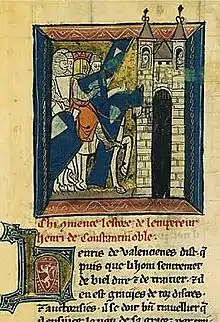Henry of Valenciennes
Henry of Valenciennes was an early 13th-century French writer, historian and chronicler of the Latin Empire.

Henry of Valenciennes was a chronicler under Henry of Flanders who left for the Fourth Crusade with the army of his patron. In 1204, following the capture of Constantinople by the Franco-Venetian forces, he became a canon in the Hagia Sophia. In 1206, the year of his patron's accession to the throne of the Latin Empire, he was tasked with compiling a chronicle mostly focused on his deeds, roughly picking up where Geoffrey of Villehardouin's chronicle concludes. As a result, Henry's chronicle is usually included with Geoffrey's in the surviving manuscripts. It abruptly ends in 1209 or 1210,[1] but it is notable for its account of the battle of Philippopolis.[2] Henry is also credited with the Lai d'Aristote, previously attributed to the Norman Henry d'Andeli.[3][4]
References
- Dr. Nicholas Paul. "Les Memoires de Henri de Valenciennes". French of Outremer. Retrieved 18 September 2022.
- of Valenciennes, Henry (1872). Histoire de l'Empereur Henri (in Old French and French). Paris: Librairie de Firmin Didot frères fils & cie. pp. 316–330.
- Zufferey, François (2004). "Un problème de paternité: le cas d'Henri d'Andeli. II. Arguments linguistiques". Revue de linguistique romane (68): 57–78.
- Zufferey, François (2004). "Henri de Valenciennes, auteur du Lai d'Aristote et de la Vie de saint Jean l'Évangéliste". Revue de linguistique romane (69): 335–358.